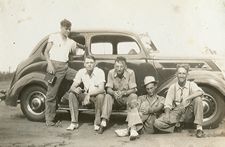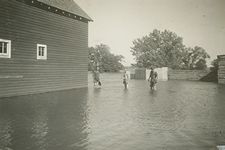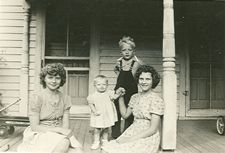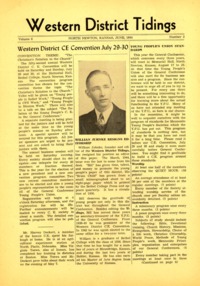| Bill's most time-consuming volunteer activity in the late 1930s and early 1940s was in leadership roles with the Western District Christian Endeavor (WDCE) of the General Conference Mennonite Church. Not everyone appreciated this passion. He later reported, "Curt Siemens couldn't understand my interest in the church." The Western District had sixty-one congregations, mostly in Kansas but also some in Oklahoma and one in Nebraska, and the WDCE attempted to energize youth groups in the congregations.. In 1937 Bill was appointed to his first district WDCE position–Peace Secretary. One of his successful projects was an oratory contest with two divisions–peace orations and missions orations. Seventeen youth entered the contest. The top three winning orators (Paul Goering, Harley Stucky, and Edwin Stucky) were all students at Moundridge High School, where Bill was debate coach. In 1938 Bill took the three winners to Saskatoon, Saskatchewan, to perform at the binational General Conference Mennonite gathering. At that meeting he was elected to a three year term as secretary-treasurer of the bi-national (U.S. and Canada) General Conference Young People's Union. |

1938 Saskatchewan Conference Trip
(click for identification and larger image)
|
At the August 1938 WDCE annual meeting Bill was elected president of the organization. He brought a cheerful and enthusiastic style to the task of organizing the executive committee. One of his letters to Florene Krehbiel, the secretary treasurer, began breezily, "‘The time has come,' the Walrus said, ‘to talk of many things! Of ships, and sails, and sealing wax; of cabbages and kings.' The time has also come for us to talk about C. E. things. So here goes." Then in a long typewritten letter he clarified in order the tasks ahead: organizing the committee: strengthening WDCE publications, planning a peace rally, "stimulating our Christian endeavorers to mission activity," promoting church-wide official papers, instituting a "look-out" system to keep in touch with scattered CE members, planning the annual youth retreat, and raising funds for a struggling Mennonite school in Saskatchewan. Bill concluded the letter with a vigorous mixed-metaphor call to action: "With all this to discuss it seems necessary for us to put our shoulders to the wheel. . . . So let's shake hands toward achieving a better and more worthwhile Mennonite Christian Endeavor in our district." Bill's greatest initiative in his first year as WDCE president was to inaugurate a new publication, the Western District Tidings. The first two issues were not very impressive–rather unattractive mimeographed newsletters dated January and May, 1939. The third issue was more sophisticated, with the 1,500 copies printed at the Bethel College printing press. Bill took charge of the subscribers list, the articles published, the relationship with the printer, and the mailing to individual and group subscribers. He paid personally the bill for printing ($19.90) and mailing ($4.80) the third issue. He acknowledged that "our paper has been in its infancy and suffering from experimentitis . . . ." But he had plans for improvement and expansion. Bill had learned something about publishing a periodical when he was a student at Bethel College and editor of the Bethel student newspaper, the Collegian. His models for the Tidings were both the Collegian and the official General Conference periodical, The Mennonite. Because the Western District Conference did not have its own periodical (nor did it have a conference headquarters), the Tidings was a notable source of information for the conference in general. Bill eventually hoped for the Tidings to expand its constituency and become the official youth paper for the entire General Conference Mennonite Church. Discussions of the role of the Tidings had an undercurrent of concern that the youth pages of The Mennonite might be an adequate source of information for and about young people. Some people thought the Tidings was too liberal or too aggressive. The two dominant themes of Tidings articles, apart from news about CE events and people, were international missions and world peace. Bill was enthusiastically committed to both causes. His primary mentor at Bethel College had been president Ed. G. Kaufman, a former missionary in China and a strong advocate of Mennonite pacifism. Kaufman taught that overseas missionary programs were means for promoting higher civilized ideals of justice and peace. Bill put into the first issue of the Tidings a complete list of all home and foreign missionaries of the General Conference Mennonite Church – a total of 128 persons – with the admonition, "Pray for them, and help support them. Is Your society doing its share?" The lead article in that issue was an account of an experience with an International Voluntary Service for Peace work camp in England, written by Bethel College student Robert Kreider. War broke out in Europe (Germany invaded Poland Sept 1, 1939) the month before the third issue of the Tidings was published. Bill's editorial in that issue, titled "Propaganda," warned against the "war hysteria" fostered by American press and radio. He had two recommendations: learn about both sides of controversial issues to get all the facts; and remember that "our best guide in our quest for truth is the Bible. . . . The method of the Bible is the method of truth." A boxed insert at the head of the first page of that issue quoted President Franklin Roosevelt, "If and when war unhappily comes, the government and the nation must exert every possible effort to avoid being drawn into the war." Although the Tidings did not provide a running political commentary, its opposition to national policies such as military conscription and involvement in the war was clear. Bill stayed on as Tidings editor after his first two-year term as WDCE president ended in August 1940. His liberal pacifism earned the mistrust of some of the more conservative leaders of the Western District Conference. One of his critics was Rev. Walter Dyck, a pastor and Western District Representative to the General Conference Young People's Union. The two clashed over the Kansas Institute of International Relations (KIIR), an adult peace education course taught at Bethel College. Conservatives thought the KIIR was too secular and insufficiently biblical in its peace teaching. At the 1942 WDCE convention, when Bill was nominated for new two-year term as president, Dyck told the gathering that Bill was not eligible for the office, because he was also serving on the executive committee of the General Conference YPU. Bill was elected nevertheless. Dyck sent Bill some letters claiming that people were raising doubts about his religious orthodoxy, and asking that Bill send him a statement of his belief on main doctrines. At one WDCE summer retreat at Camp Wood, Bill was offended by Dyck's response to his personal testimony. As Bill later wrote of it: "We went under the pagoda for a brief meditation and worship period. When my turn came I told, as quite consciously planned to make more or less sure it was my true feeling, about the importance my Church to me, and of the deep meaning in baptism." Dyck's response was to "snort," and to say "That's all right. IF it's the real thing!" Some tension between liberals and conservatives was an ongoing part of Bill's church work, but it was not so divisive or acrimonious to undermine the work of the organization. As an officer in the General Conference Mennonite Young Peoples Union, Bill planned to attend the triennial conference at Souderton, Pennsylvania, in August 1941. After returning from Lawrence that summer, he and Meta made a "honeymoon trip" east--more than four years after their wedding. They traveled together with their good friends, Dave T. and Marge Stucky, who lived on a farm just a mile north of the Juhnke homestead. They stopped at tourist sites along the way, culminating with a visit to Niagara Falls. The General Conference at Souderton adopted a resolution on the approaching war and a conservative doctrinal statement for the General Conference Mennonite seminary. Bill promoted his plan there, without success, to expand the Western District Tidings into an official General Conference-wide youth paper. While Bill and Meta were traveling, three-year-old Jimmy stayed with the Juhnke grandparents, in the care of Bill's younger sisters, Marie and Martha. Marie wrote to Bill and Meta: "After breakfast on the real table, Jim went to the playhouse and started to make a play meal. He baked a cherry pie, cooked beans, made cookies, tapioca, and set the table for Mart, me and the doll and himself. . . . Jim said, 'Now wash the dishes.'" Bill took a lot of photos on the trip and put them into an album with sprightly captions that entertained the family for many years. "Question: How many quarts per gallon of water flows over the Niagara Falls in an hour? Answer: Four." Two weeks after returning from the trip, on the morning of September 6, 1941, the "worst and most sudden flood rampaged down the Dry Turkey Creek." Bill had planned to go to Wichita that day for a state Hi-Y Council meeting. The road north of the farmstead was flooded, but he was able to get out via the south road at 7:50 a.m. When he returned that afternoon, there was about a foot of water in the barn and the well near the milkhouse was threatened. Bill and Meta rescued several chickens that were marooned on a high spot north of the barn. Periodic flooding was a recurring event on Juhnke farmstead. |

Flooded Juhnke barnyard, September 6, 1941
| As Bill prepared to end his second two-year term as WDCE president, he planned to hand over editorship of the Western District Tidings to others. As in the beginning, he was still keeping track of subscriptions, arranging for the printing, and preparing the printed copies for mailing in his own home. His final issue was March 1944. He turned over the mailing list to Helen Hiebert Mueller, WDCE secretary-treasurer. Although Bill was undeniably happy to be relieved of his editorial responsibilities with the Tidings, the nostalgia in his account suggests mixed feelings. For more than five years he had published the Tidings as something of a one man show. The June, 1944 issue had his photo on the front page with the announcement of his resignation. It said, "'Bill' has given time, talent, and money to promote the young people's paper of this district. His 'Brain Child' has grown from a small mimeographed sheet to an eight-page paper which is printed by the Bethel College Press and appears quarterly. It has a circulation of 1500." |
| In his final issue as editor of the Tidings, March 1944, Bill
restated his strong wartime commitment to Mennonite pacifism. "Mennonite
Christians," he wrote, "can hardly agree that any Caesar's voice deserves
first obedience. That first loyalty, we humbly submit, is and must forever
remain a loyalty to God – to the voice from the hillside of Galilee."
The editorial concluded with a statement of five "essentials of the
Mennonite belief and practice." These included "(1) belief in God the
Creator; (2) belief in the divinity of Jesus; (3) belief in the guidance
of the Holy Spirit; (4) belief in the Church's Stewardship of a Saving
Gospel, and (5) practice of Christian Brotherhood to all mankind." This
formulation would not satisfy the strict conservative evangelical or
fundamentalist critics, but they surely represented Bill's own heartfelt
convictions – even as his personal letters showed him wrestling with
issues of moral relativism that he encountered in graduate school at
the University of Kansas.
Bill's front-page article in that final issue of the Tidings was a spirited call for young people to become better informed and more active Christian Endeavor members. He lamented the fact that thirteen of the sixty churches in the Western District had no active CE groups. He took personal responsibility for the apparent lethargy. He had "not written materials interestingly enough, . . . not gotten individual young people in the churches of the district to respond, . . . (and) not inspired the work and officers of the Convention so that information on the projects is more general." Bill's self-criticism was more a measure of his high goals than of his success as WDCE president and Tidings editor. It could be that the war brought on changes among Mennonite youth that Bill interpreted as decline. The Tidings did cease publication after 1946, and the Western District Youth never again sponsored so ambitious and impressive a publication. The relationship of Bill and Meta to their parents and siblings is not well documented, although some information is in a few letters that survived from their three summers in Lawrence. Alvina Juhnke's letters showed her pride in her son ("I know you will prove yourself as to be worthy of your honor.") but also concern that all his worldly contacts not divert him from the church. "I know we cannot join a greater society then (sic) to be a Christian." On one occasion Bill's younger brother, Carl, reported to their mother about a conversation Carl had in Moundridge with Peter W. "Sheik" Goering, who had returned from a year at Hartford Biblical Seminary in Connecticut. Pete reported that some of the seminary teachers disbelieved and mocked the Bible. When Carl protested, "Pete also said Bill Juhnke does not believe everything in the Bible." Alvina was alarmed and wrote to Bill, "I cannot tell you, how much it does hurt a Mother when she hear's (sic) things like that about her son--I know the only happy man on earth, is the one that believes in the Bible--as God's word . . . ." The Juhnke family was also challenged when some members were drawn to the ministry of Orlo Dirks, an evangelical preacher in Moundridge who started a "Calvary Tabernacle" congregation. Dirks, of Mennonite background himself, was anti-denominational. He suggested that many Mennonites had adopted a "works righteousness" theology and were not saved. The Calvary Tabernacle had connections with Nye J. Langmade, a radio preacher in Salina who started a fundamentalist Bible school. Some Mennonites attended Langmade's school. Bill's sister Emma and her husband, Joseph Stucky joined the Calvary Tabernacle group. Abe and Alvina Neufeld also were attracted to Dirks. In one letter to Bill and Meta, Bill's sister Marie reported a rumor that "we had joined the 'Tabernacle hook-up,' and . . . that all we kids were re-baptized by Orlo." The rumor was false, but the family no longer had its total Mennonite solidarity. Emma and Joseph were also unhappy because, in their view, Ernest Juhnke had withheld their fair share of land inheritance. Bill wrote a defensive letter that complained about Emma and Joe, who seemed to think that Ernest Juhnke "was running a gold mine and would give him half interest." Emma and Joe had said, Bill wrote, "that they were sorry for Meta since she married me." Bill defended his religious orthodoxy:
Bill wrote that everyone should "work together for the good of the whole family--and be willing to sacrifice to that end." He was aware that "my family is helping me out a whole lot, especially when I leave home and go away like this." He hoped to "do my share to help back when I will be able to." When Meta spoke about the charges against the evangelical orthodoxy of Eden Church Mennonites, she defended her people by quoting a verse her grandmother had taught her: "Christi Blut and Gerechtigkeit, dass ist mein Schmuck und Ehrlichkeit. Damit werd' ich vor Gott besteh'n, wann ich zum Himmel werd eingehen." ("The blood and righteousness of Christ are my treasure and cloak. With them I will stand before God when I enter Heaven.") That is what Meta believed. In the spring and summer of 1942, Bill was preoccupied with research and writing of his master's thesis, "The Administrative and Teaching Problem Relating to Controversial Issues in a Select Group of Central Kansas High Schools." He gathered information via questionnaires and interviews from administrators and social studies teachers in seven Kansas schools (Moundridge, Inman, Buhler, Nickerson, Halstead, Burrton, Haven, and Pretty Prairie) about the teaching of controversial issues. He did not uncover any major controversies, and his conclusions seem, in retrospect, quite bland. For example: "The task of the administrator as it relates to controversial issues is to assist the school board in working out the school policy, to secure the cooperation of a well-selected faculty, to insist that major complaints be put in writing, and to purchase and secure the use of supplementary library reference materials." Bill's research into central Kansas high schools, all of whom had some Mennonite students, may have had a hidden agenda. He was looking for another job. He told his friends that he hoped to move into a school superintendency after getting his masters degree in school administration. When no administrative position opened up, he decided to move to Buhler High School. Buhler was a larger school and the change involved a nice salary increase. It also involved substantial inconvenience. Buhler was nineteen miles southwest of the Juhnke farm, so Bill and Meta had to rent a house in Buhler and find renters for the farm home during the school year. They rented a wood frame house not far from the high school. The back yard on the lot was large enough and had a little shed so they could bring a small flock of chickens. The house owner agreed to pay for paint for Bill to improve the house, and then sold the house after they had been there for a year. In his first year at Buhler, Bill wrote to Harley Stucky, a former Moundridge student who had gone on to graduate school, "I like it here at Buhler. Of course, it is not much different than teaching at Moundridge or anywhere else." He taught the same courses, served as the Hi-Y sponsor, and directed the debate program as he had at Moundridge. The debate topic that year appealed to his liberal instincts: "Resolved, that a federal world government should be established." His continuing progressive religious enthusiasm and his urge to inspire the younger generation were manifest in his letter to Stucky: "With the help of dynamic young people like Harley Stucky we can now lay plans to set the world on 'fire' for Christ and his Kingdom, and we can then begin as soon as the 'cease fire' order for the war makers is given." The transition to Buhler was not entirely smooth, however. Years later Meta remembered that Bill was disappointed because the Buhler students did not laugh at his jokes the way the Moundridge students did. The Buhler school district extended to the city of Hutchinson, and included a higher percentage of non-Mennonites than did Moundridge. The big family event in Buhler was the birth of Janet Ann Juhnke on Thanksgiving Day, November 26, 1942. On that day Meta's brother, Harvey, married Viola Goering, so Meta and Bill missed that wedding. Janet was born in the Hertzler hospital at Halstead, a facility built by Kansas' famous "Horse and Buggy Doctor," Arthur E. Hertzler. Jimmy was four and a half years old and remembers when Janet was brought home from the hospital, and how he was scolded for wanting to lift up a cover to take peek at his little sister. The Buhler High School newspaper, Crusader (December 15, 1941), reported Bill's comment: "'She'll be two weeks tomorrow,' Mr. Juhnke said proudly. . . . 'And she's good looking like her daddy.'" One incident that survived in family lore was when Bill took Jimmy to school one evening to play with the latest technology--a wire audio recorder. With the recorder running, Bill attempted to create a little drama. He had some cellophane he used to simulate the sound of burning: "Oh, Oh! What is that we hear? The house is on fire! What shall we do? I'll get Mama out. You take care of Janet." And Jimmy responded, "Janet won't burn!" For her part, Janet wasn't interested in being rescued by the would-be heroic males in her life. She was remembered as something of a "mama's baby," not eager to be handed off to other people. For their second year in Buhler, Bill and Meta rented another place somewhat farther from the school, but nearer to the First Mennonite Church. They could walk to Sunday services. During that school year Bill's youngest sister, Martha, and her friend, Mary Ellen Stucky, came to live in an upstairs room and to attend Buhler high school. Mary Ellen got sick, went home, and then died of a ruptured appendix--a great shock to the family. |

Spring 1942, west porch of the house in Buhler.
Left to right: Mary Ellen Stucky, Janet and Jimmy, Martha Juhnke
| The two years in Buhler were a rich experience for Bill and Meta. Bill later said that one benefit was that it "got me in touch with a lot of Mennonites--from Hoffnungsau, from First Mennonite in Buhler, some Mennonite Brethren." But by 1944 the long-lasting World War dictated another change. Bill feared that he would be called in the military draft, and knew that he would have a better chance for exemption if he were a full-time farmer. So after that school year, in May 1944, Bill and Meta moved back to the farm by Elyria and put their roots down more firmly than ever. Just about everything in those years, it seemed, was deeply influenced by the war. |
